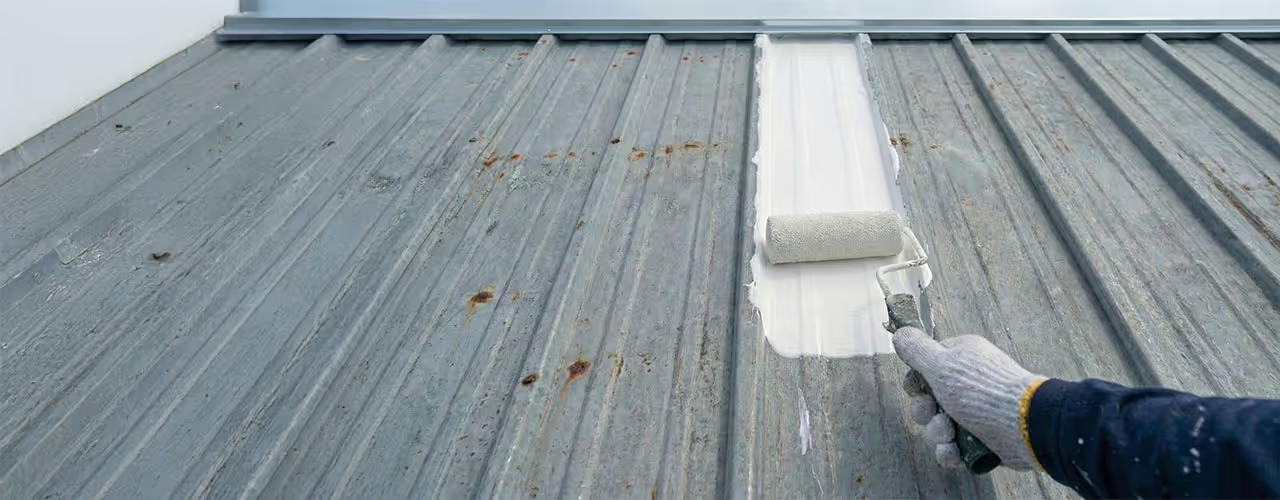

.avif)





The answer comes down to structure and corrosion. A metal roof is a good coating candidate when the panels are still structurally sound, the purlins and decking underneath are in good shape, and rust is present only as surface corrosion, not deep through-holes. If you have widespread panel failure, significant rust-through, large areas that move when you walk on them, or serious framing issues, a coating will not fix those problems. In Nashville, we typically inspect seams, fasteners, panel laps, penetrations, and rusted zones first; if the roof holds up structurally and repairs are reasonable, a coating system is often the most cost-effective choice for commercial properties.
On a properly prepped and installed system, commercial metal roof coatings in Nashville typically offer 10-, 15-, or 20-year warranties, depending on the product and specified mil thickness. Real-world service life matches those ranges when the roof is prepped correctly (including repairs, cleaning, rust treatment, and seam reinforcement) and basic maintenance is followed. Many manufacturers and contractors provide renewable warranties, which means that at the end of the term, you can re-inspect, recoat at a specified thickness, and extend coverage instead of starting over with a new roof. For a business that wants predictable long-term costs, coatings often convert an unknown replacement date into scheduled, plan-able renewals.
While every roof and project is different, commercial metal roof coatings are typically significantly less expensive than full tear-off and replacement. You avoid the cost of removing and disposing of old panels, you minimize structural repair scope, and you reduce labor and material expenses associated with installing an entirely new system. Coatings are especially advantageous on roofs where metal is still structurally sound but leak-prone or weathered. Many Nashville businesses use coatings as a way to stabilize roof performance and buy 10–20 additional years of service at a fraction of full replacement cost, freeing capital for other needs without kicking the can on roof issues.
For most commercial metal roofs in Nashville, silicone is the best overall coating option in terms of durability, leak control, and long-term value. Nashville roofs deal with three consistent problems: heavy downpours that can leave water standing in low spots, intense summer sun that bakes the roof for months, and constant expansion and contraction of metal panels as temperatures swing. Silicone is the one coating chemistry that handles all three better than anything else we have worked with.
Silicone coatings stay stable under ponding water, which is a major advantage on flat or low-slope metal roofs where certain areas never fully drain after a storm. Where acrylic coatings often break down, blister, or peel in standing water, silicone continues to protect the roof surface. At the same time, silicone has excellent UV resistance, so it does not chalk or degrade quickly under Tennessee sun. That means the coating keeps its reflectivity and protective properties longer, helping keep the roof cooler and the building more comfortable.
Silicone is also highly elastic, which is critical on metal roofs where seams and fasteners move constantly as the panels expand and contract. A good silicone system will flex with that motion instead of cracking at those stress points. When we install silicone on a commercial metal roof, we clean and prep the panels, tighten or replace fasteners, reinforce seams and penetrations, and then apply the coating to create a continuous, watertight membrane over the entire roof.
Other coatings, such as acrylic or polyurethane, still have their place in certain applications, but if a Nashville business owner asks for the single best all-around product for a tired, leak-prone metal roof in this climate, silicone is almost always the system we recommend. It delivers the most reliable mix of waterproofing, UV protection, and life extension for the money, and it can be renewed with future recoats instead of forcing a full tear-off when the warranty period ends.
Yes, depending on the building type and the specific coating system used, metal roof coatings can qualify for federal energy-efficiency incentives. On the commercial side, qualifying projects may be eligible for the Section 179D Energy Efficient Commercial Buildings Tax Deduction, which allows certain energy-saving improvements to be deducted in the year they are placed into service. When a coating system is part of a cool roof strategy that measurably reduces solar heat gain and improves the overall building envelope performance, it may help a commercial property meet the 179D thresholds, especially when combined with other upgrades such as insulation or HVAC improvements.
Residential property owners may be able to take advantage of the Energy Efficient Home Improvement Credit when they install ENERGY STAR certified roofing materials designed to reduce heat absorption. This credit has historically applied to certain metal and asphalt roofing products with approved reflective coatings, and in some cases can extend to coating systems when they meet ENERGY STAR reflectivity and performance requirements. In both residential and commercial cases, the tax benefit usually applies to the cost of the qualifying energy-efficient materials alone, not to labor or other non-qualified components of the project.
Proper documentation is critical. Property owners should obtain a Manufacturer’s Certification Statement or equivalent documentation from the coating manufacturer confirming that the system meets IRS and ENERGY STAR criteria for the specific tax year. Because the rules and thresholds can shift over time, and because eligibility depends on how the project is structured and what other work is being done on the building, it is important to consult with a tax professional or accountant who understands Section 179D and residential energy credits before claiming any deduction or credit. The bottom line is that a reflective, energy-efficient cool roof coating can offer both long-term performance benefits and potential tax advantages when it is specified and documented correctly.